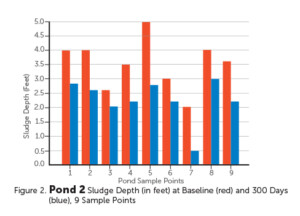by Heather Jennings, PE

Here’s a case study involving Microplex® JS.
Project Summary
Each year a summer camp in Utah becomes inundated with campers. The camp’s wastewater treatment plant goes dormant during the winter months with only occasional flows. The biomass becomes very inactive and in years past became overloaded and upset when the high organic load arrived at the plant at the beginning of the camping season. After battling with the plant year after year to get it to accommodate the high spring load and function correctly, the operator looked for a way to jump-start the system.
Through use of Microplex® JS, the plant quickly acclimatized to the higher load and met the system’s permit requirements. In addition, the operator is very happy with the results of the inoculation with Microplex® JS and how the plant continues to function during the camp’s open season. He plans to continue to use Microplex® JS at the start of each year.
Click here to read the full report.
Click here for more information regarding Microplex® JS.
Related Posts

BIO ENERGIZER® Reduces Sludge at Municipal Wastewater Treatment Facility in New Mexico
A small town in New Mexico (pop. 1,300) had a municipal wastewater system with a flow rate of 50,000 gallons per day. The system included a series of three lagoons. A recent sludge judge showed Pond 1 had an average sludge depth of 1.9 feet, Pond 2 averaged 3.5 feet, and Pond 3 averaged 2.7...

Use of Biostimulants and Buffers for Upset Recovery in Paper Mill Wastewater Systems
By Heather Jennings, PE Industrial pulp and paper wastewater is considered one of the more challenging waters to treat using biological methods, which depend on microbial activity to effectively remediate the wastewater. Wastewater treatment systems are often influenced/impacted by increased hydraulic and/or COD (chemical oxygen demand) loading as mills add new chemicals or otherwise modify...

California Approves First 8 Fertilgold Products for CDFA-OIM Status
The California Department of Food & Agriculture (CDFA) has registered 8 Fertilgold® Organics products as Organic Input Materials (OIM) that can be sold in the state. Those products include the following: secondary macronutrients Fertilgold® Ca and Fertilgold® Mg, and micronutrients Fertilgold® B, Fertilgold® Co, Fertilgold® Mo, Fertilgold® MoN, Fertilgold® Zn, and Fertilgold® Micros I (which...

